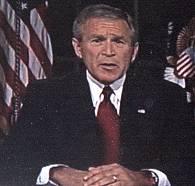2006年VOA标准英语-Bush Commemoration of 9/11 Focuses on Iraq(在线收听)
By Peter Fedynsky
Washington, DC
13 September 2006
watch US Focus on Iraq
President Bush concedes that Saddam Hussein had nothing to do with the September 11, 2001 terror attacks on the United States. But the president devoted most of his attention to the war in Iraq during his address marking the fifth anniversary of those attacks Monday night. VOA's Peter Fedynsky reports critics of Mr. Bush's Iraq policy say it has not made America more secure.
-----
 President Bush delivering the address to the nation |
||
"The safety of America depends on the outcome of the battle in the streets of Baghdad. Osama bin Laden calls this fight 'the third World War' -- and he says that victory for the terrorists in Iraq will mean America's 'defeat and disgrace forever.' If we yield Iraq to men like bin Laden, our enemies will be emboldened. They will gain a new safe haven. They will use Iraq's resources to fuel their extremist movement."
But critics say the Iraq war is not only creating more terrorists than it eliminates, but also depriving the United States of an intangible resource -- international goodwill, which emerged in the immediate aftermath of 9/11.
Ivo Daalder is a national security analyst at the Brookings Institution think tank in Washington, D.C., "We could have used that in order to marshal the grand coalition of nations and of people against the terrorist and we did that starting in Afghanistan. But we never finished in that kind of sense and we basically threw away the goodwill, the power that came with that goodwill and dug a hole.
And the hole now is so deep and we are so alone at the bottom of that hole that few people are willing to help."
The United States invaded Afghanistan to remove the Taleban regime. The Taleban had given safe haven to al-Qaida terrorists who carried out the September 11th attacks.
But critics say the Iraq war has diverted American resources from the effort in Afghanistan, resulting in the dispersal rather than destruction of al-Qaida.
Former President Bill Clinton says the Bush administration made an improper link between Iraq and last month's London-based plot to blow American-bound airplanes from the skies.
"I don't think foiling that London bomb plot has any bearing on our Iraq policy. They seem to be anxious to tie it to al-Qaida. If that's true, how come we got seven times as many troops in Iraq as in Afghanistan?"
President Bush insists that he is honoring his pledge made soon after 9/11 to use every element of national power to fight terrorists, wherever they may be, including Iraq. "One of the strongest weapons in our arsenal is the power of freedom. The terrorists fear freedom as much as they do our firepower. They are thrown into panic at the sight of an old man pulling the election lever, girls enrolling in schools, or families worshiping God in their own traditions. They know that given a choice, people will choose freedom over their extremist ideology."
The day after the president's speech, police in Baghdad found the bodies of at least six decapitated people, apparently killed in sectarian violence. Mr. Bush acknowledges a difficult road ahead in the war against terror. But he says the building of a more hopeful Middle East holds the key to peace for America and the world.